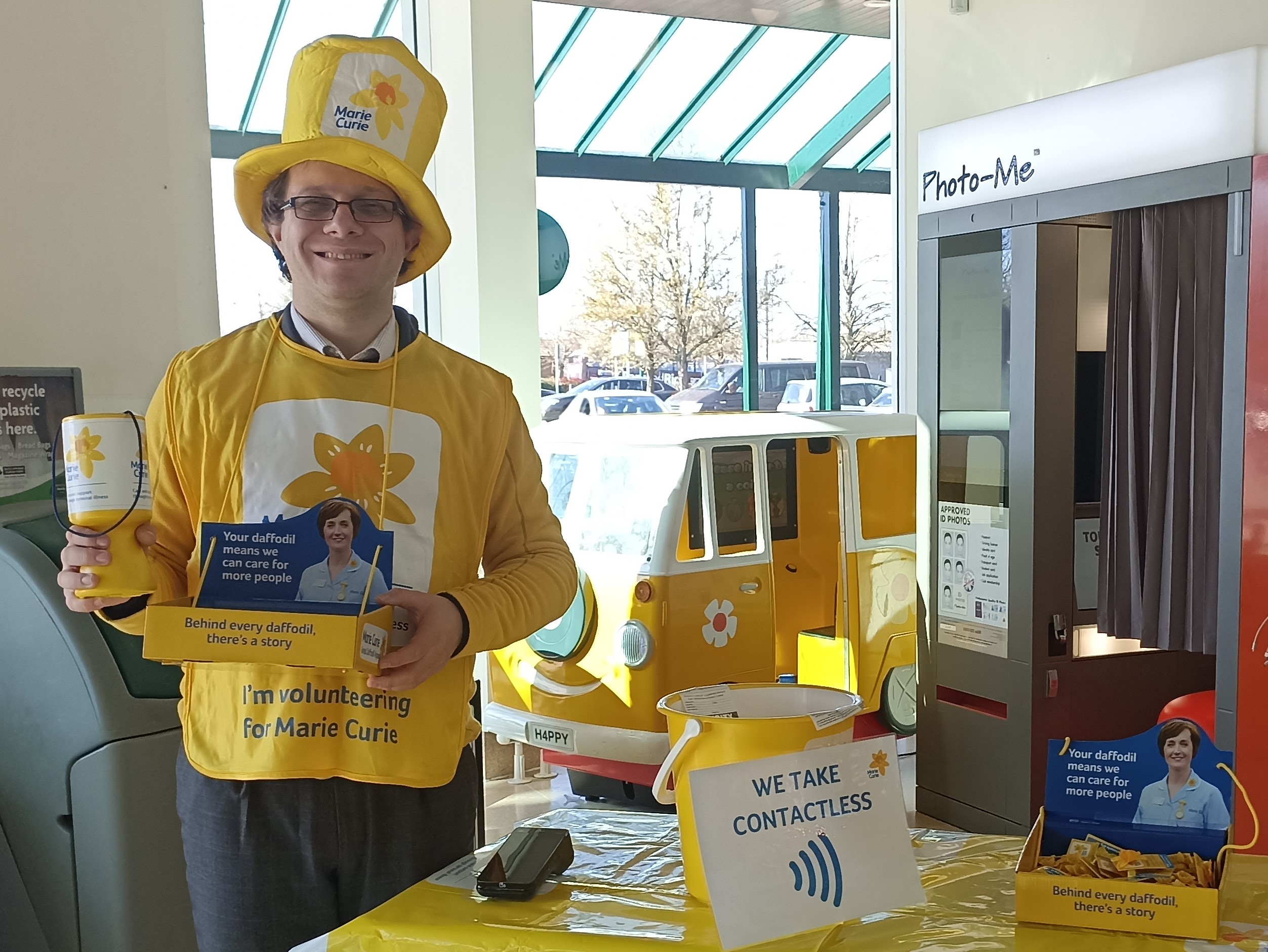
Most of us are aware that the charity Marie Curie provides “care and support through terminal illness” and many readers will have seen collectors in distinctive, bright yellow “daffodil hats” collecting funds for the charity. (In fact, our Members often help them with their fundraising efforts.) Nevertheless, it was very interesting to hear from Florin Diaconu, the Community Fundraiser for Kent and Senior Community Fundraiser for London & South East, as he was able to tell us so much more about what the charity does.
Florin started his talk with some lovely pictures of him and his daughter – to remind us that everyone makes special memories with their loved ones, and to emphasise that this is just as true for those near end of life. It’s therefore important to be able to offer high quality care in the home whenever possible.
Florin went on to tell us a little history about the charity – starting with some words and pictures about Marie Curie herself – “The lady who started it all”.
Marie Curie is renowned worldwide as the Nobel Prize-winning scientist that discovered radium and polonium, and for her contribution to finding cancer treatments. We learned that she allowed her name to be used by the Marie Curie Hospital in North London which, until its destruction in the Second World War, treated female cancer sufferers with radiology. When the hospital was re-established, it was as a charity under her name – marking the start of the present-day charity.
The charity is now a major UK charity for people living with any terminal illness, not just cancer, and their families, and offers “expert care, guidance and support” to help those with terminal illness “get the most from the time they have left”. The charity also leads the conversation about end of life.
We saw a touching video about life with a terminal illness and learnt how Marie Curie nurses “provide hands-on support in the comfort of people’s homes” allowing, for example, people to stay in their own home for as long as possible.
It was striking to learn about the impact of Marie Curie’s work. For example, people who had care from the Nursing Service were three times less likely to have an emergency admission. There are financial benefits too – average hospital costs are £1140 lower per person for Marie Curie Nursing Service patients.
As well as providing nursing services, the charity provides information and support services (such as its “helper service”), has a number of hospices across the country, and supports research.
Last year alone they estimate they helped more than 69,000 people directly, and reached over 2 million more. A “year at a glance” slide gave some remarkable statistics. For instance, over 42,000 people were cared for through their community nursing – a 17% increase on last year. 99% of nursing service patients/families described the service as very good/good.
Florin also showed a video showing what Marie Curie hospices are like.
During his talk Florin told us about the charity’s campaign to stop people dying while waiting for benefits, which many of us will have seen covered in the press.
Just as we all appreciate the key workers that helped us though the pandemic, we should also remember the volunteers. One of Florin’s slides reminded us of the sacrifice many of the Marie Curie Team made by continuing to provide support during the pandemic; he paid tribute to those lost from their team to Covid-19.
Florin was keen to tell us all about the National Day of Reflection, celebrated on the 23rd March. It is a day to “remember, connect and reflect. A day dedicated to all people that died during COVID time, not only with COVID.” (Read about it here: https://www.mariecurie.org.uk/get-involved/day-of-reflection)
One action that Marie Curie took during the pandemic was to open an on-the-phone bereavement service. That service is still open to anyone that wants to talk to someone following a bereavement, whether the bereavement was expected, happened recently or was some time ago. They can also support people before a loved one dies. The phone number is 0800 090 2309.
In his final few slides Florin told us how we can all make a difference – by donating, fundraising, volunteering, or even leaving a gift in our Wills.
You can find out more about Marie Curie here.
Further links of interest include:
https://www.mariecurie.org.uk/help/support/marie-curie-support-line – The support line and bereavement service
https://www.mariecurie.org.uk/policy/campaigns – the policy and campaign section
https://www.mariecurie.org.uk/who/annual-report – the latest annual report
Picture: Florin helps Marie Curie fundraising at Morrisons in Canterbury. Picture credit: Florin Diaconu/Marie Curie.
With thanks to Florin for help with this article.


